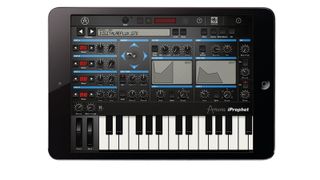Arturia's Technical Director, Adrien Courdavault, brings us up to speed on the company's past, present and future successes.
How did Arturia get started? What was your first product?
"Arturia started in 1999, when digital audio technology was already found in all studios. Frédéric Brun and Gilles Pommereuil founded the company to create simple and affordable products to bring music to everyone using a computer. The first product was Storm - a virtual studio with built-in instruments and effects."
Processing power keeps increasing. What are some things that are possible now that weren't feasible, say, ten years ago?
"We can use more CPU than before and be more precise with our algorithms; we can make better-looking interfaces without killing the performance. A lot of software products are now really different inside, while not too much seems to have changed (except the GUI) for the users."
Your soft synth emulations are usually endorsed and approved by the makers of the original hardware units. What unusual requests or issues have come up during the approval process?
"Very often the discussions are about the quality of the emulation, especially when it's about reproducing any kind of defect that may exist but which is part of the beauty of the original.
"One unusual request was when a sound designer - who was completely in love with a synthesiser we were reproducing - wanted us to make a GUI to show the internal electrical components, to let the user change the internal component shape and therefore the sound, which would have been fun to make but hard to understand!"

With the release of the iProphet, you now have a roster of three iPad synths. Will the iPad remain its own music-making 'ecosystem', or do you think it'll receive better integration with desktop machines and hardware?
"iPad is now really common for musicians, and some interfaces are nice to use on iPad, but not all. Improving the integration with other systems is really important. The future will probably see the gaps between phones, tablets and computers become less important, and we'll have to work on every kind of platform. The OSes are already almost the same.
"Also, Android - and maybe Windows Embedded - will come to the music market, too, which would open up the iPad ecosystem even more."
What's next from Arturia?
"We'll soon update our software to improve the user experience for everyone, and some new products will come to answer a lot of requests for various kind of products.
"But, most importantly, Arturia is about to go into a new market to fill the gaps between our products in an area where we think there is something new to bring to the musicians: audio interfaces. You will hear more about that soon."


